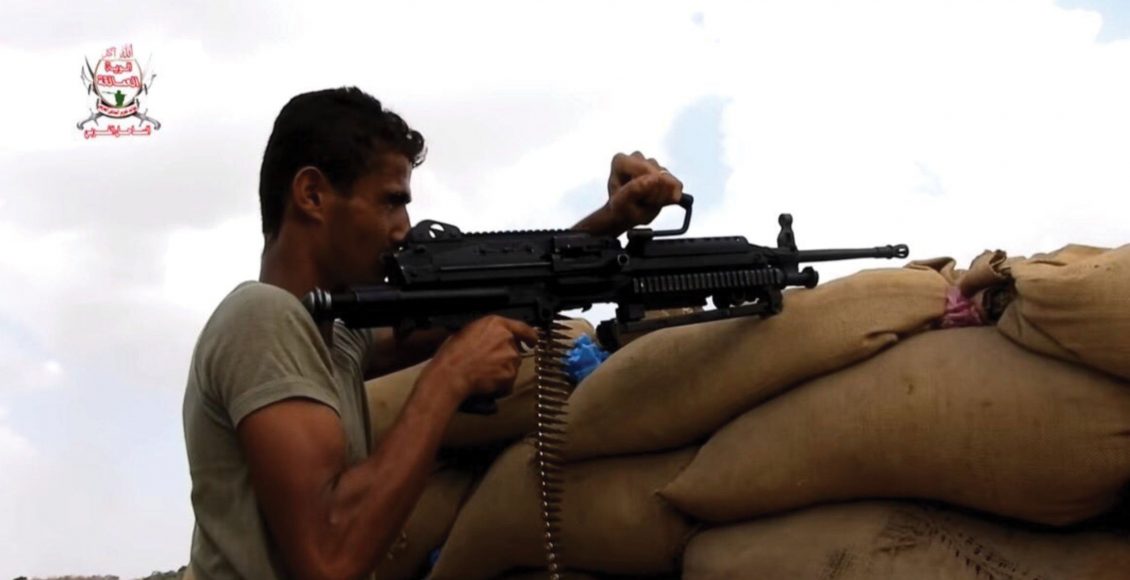SANAA, March 24 (YPA) – The Belgian humanitarian organisation Peace Action has issued a report detailing the extent of Belgium-based weapons exports to Saudi Arabia and the United Arab Emirates, and through them to various terrorist organisations that are active in Yemen.
The NGO used reports of Amnesty International and leaked internal documents of the weapons industry in order to detail the role of corporations such as FN Herstal and CMI Defence in the war against Yemen.
According to these sources, the FN factory alone, known for such weapons as the FN FAL battle rifle and the Minimi light machine gun, accounted for no less than 1 billion euros worth of arms exports to the Saudi kingdom. This puts Belgian export to Riyadh at the number 1 of all European countries, exceeding British support almost tenfold.
According to a report by German broadcaster Deutsche Welle, Belgian weapons have consistently ended up in the hands of the Abu al-Abbas militias. Abu al-Abbas is a Wahhabi organisation that is currently active in the infighting in Taiz city, and is notorious for its close ties to Al-Qaeda.
Aside from this, Amnesty International reports the use of the Minimi machine gun by the UAE-backed Giants Brigades in its murderous attacks against the port city of Hoeidah in direct violation of peace agreements.
Aside from the FN company, the lesser known corporation CMI Defence also plays a pivotal role in supplying the Saudi and Emirati war machine.
At least 224 gun turrets for armoured vehicles were delivered to the Saudi National Guard have been delivered to Riyadh in the past 20 years. In 2014, this contract was increased with an order of another 238 turrets, for a total cost of 3.3 billion euros.
The Belgian company signed a cooperation agreement with General Dynamics from Canada in order to meet this production quota.
Next to the Belgian and Canadian role in production, France also plays a role in the sordid history. In 2015, CMI Defence gained permission to use a former French army base in order to construct a so-called “campus”.
Ever since, and until at least 2020, CMI Defence has been hosting and training Saudi military personnel at the base, teaching them in the use of the Belgian weaponry.
While public outrage against both Belgium and Canada has forced both countries to “reconsider” the contracts and exports to Saudi Arabia, lobby groups in both countries are putting severe pressure on the two governments, supported by several high-ranking former politicians.
Meanwhile, CMI Defence has already signed an accord with Riyadh planning to open a factory in Saudi Arabia itself, thus circumventing any possible export restrictions that may be imposed in the future.
While the northern autonomous region of Belgium, known as Flanders, has officially stopped any further sale of weapons directly to Saudi Arabia in 2017, there are no measures in place to prevent reselling of Belgian equipment by third-party traders and countries. It is estimated that in 70% of Flemish military export cases, it is unknown who the ultimate user will be.
Before the moratorium on Saudi exports was installed, large amounts of radar and combat management systems were sold to both Saudi Arabia and the UAE.
The Eurofighter Typhoon, used by Riyad for the relentless bombing of Yemeni civilian targets, uses Belgian radar systems. And the corvettes of the Emirati fleet, used for the illegal blockade that is starving the men, women and children of Yemen, uses combat technology produced in the European country.
The port city of Antwerp is considered to be a likely hub for export of military material to Saudi Arabia. Ships of the Saudi national shipping carrier Bahri have made port in Antwerp several times over the past years. And while their content is not known to the public, the Bahri company is known for its extensive shipping of weapons and military vehicles to the kingdom’s armies.
Source: YRW
E.M


